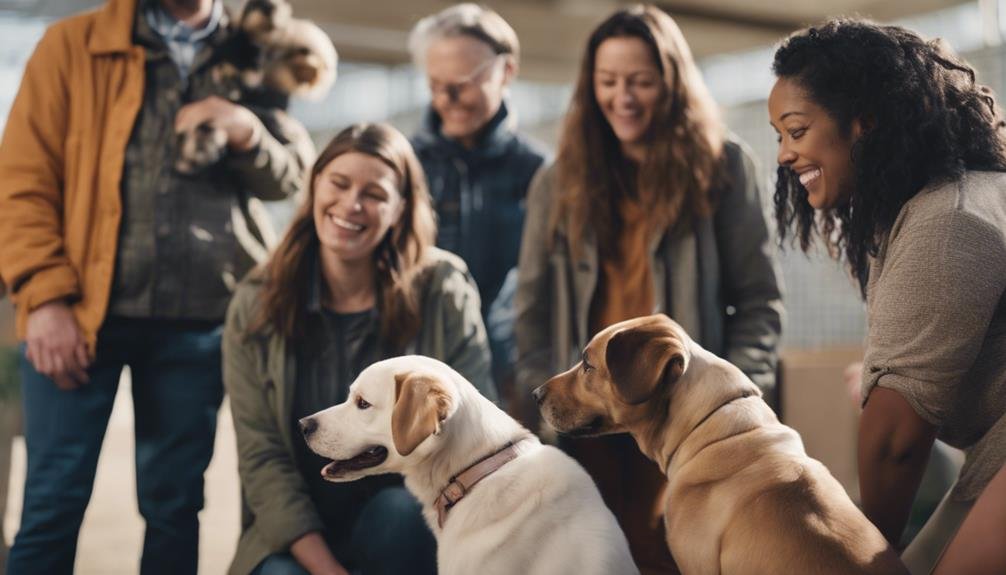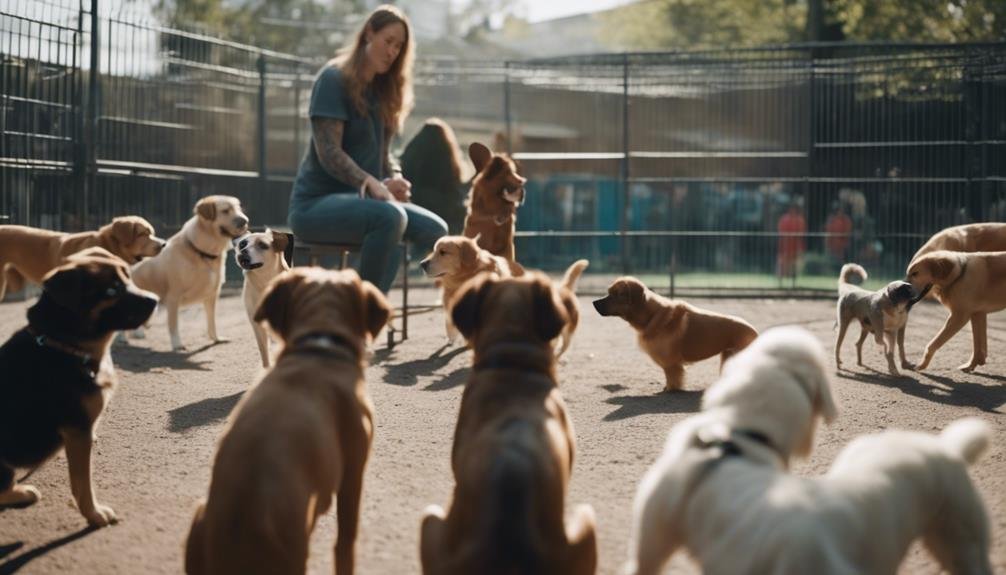
Are you ready to take the leash and start the journey to find your new canine companion?
Exploring the avenues of dog adoption is akin to uncovering hidden treasures waiting for you to discover.
From understanding the importance of selecting the right source to considering essential factors for a successful adoption, the path to finding your new best friend is paved with choices that will shape your future together.
So, are you prepared to embark on this meaningful journey to welcome a loyal companion into your life?
Key Takeaways
- Check local rescues and shelters, including online databases, for available dogs.
- Consider rescue organizations for foster care, behavior training, and breed-specific focus.
- Choose responsible breeders for healthy practices and information on puppy’s parents.
- Understand adoption considerations like history, fees, return policies, and benefits of senior dogs.
Sources for Dog Adoption
Looking to adopt a dog but not sure where to start? Begin your search by tapping into reputable sources like the American Society for the Prevention of Cruelty to Animals (ASPCA), Petfinder, Adopt-a-Pet.com, and The Shelter Pet Project. These organizations provide valuable directories and promote shelters as the primary choice for adopters.
Keep an eye on online databases for real-time updates on available animals. By utilizing these resources, you can increase your chances of finding the perfect furry companion while supporting ethical adoption practices.
Research, browse, and reach out to these established entities to kickstart your journey towards welcoming a new four-legged member into your family.
Finding Dogs Locally
To locate dogs in your local area, start by checking updates from nearby rescues and visiting shelters in person to assess available animals. Local rescues often have social media pages or websites where they post pictures and profiles of dogs waiting for adoption. By visiting shelters, you can see the dogs firsthand and get a sense of their personalities. Not all animals are listed online, so this is a great way to discover hidden gems.
When you go to the shelters, take note of the cleanliness and safety of the facilities, as well as how the staff interacts with the animals. This hands-on approach can help you find the perfect furry companion right in your own community.
Rescue Organizations

When exploring options for adopting a dog, consider engaging with rescue organizations that provide foster care, positive behavior learning, and a focus on finding the best homes for their canine companions. These organizations often prioritize the well-being of the dogs in their care and work diligently to match them with suitable families. By adopting from rescue organizations, you are not only giving a dog a second chance at a happy life but also supporting a meaningful cause. Take the time to connect with these organizations to learn more about their adoption process and the dogs available for adoption.
| Rescue Organizations | Description |
|---|---|
| Foster Care | Dogs are placed in temporary homes |
| Positive Behavior Learning | Training provided to improve behavior |
| Breed-Specific Emphasis | Focus on specific breeds for adoption |
| Question Expectations | Potential adopters may be asked questions |
| Home-Finding Priority | Priority given to finding the best homes |
Choosing Responsible Breeders
Considering responsible breeders over puppy mills or backyard breeders is crucial when seeking a new canine companion. Responsible breeders prioritize the health and well-being of their dogs, ensuring they’re ethically bred and raised in a safe environment. By choosing a reputable breeder, you can receive valuable information about the puppy’s parents, health history, and genetic background.
It’s recommended to seek referrals from trusted sources like veterinarians or national kennel clubs such as the AKC. Responsible breeders adhere to healthy breeding practices, conduct health screenings, and provide proper care for their dogs. Avoiding puppy mills through thorough research and selecting a responsible breeder can lead to a fulfilling and long-lasting relationship with your new furry friend.
Adoption Considerations

Begin your journey into dog adoption by carefully evaluating shelters and rescue organizations. When considering adoption, it’s essential to keep several factors in mind to ensure a successful match. Firstly, inquire about the source and history of the dogs available for adoption. Understand the behavior tests and medical care each dog has received to assess compatibility. Clarify adoption fees and return policies with the shelters beforehand. Additionally, explore the benefits of adopting senior dogs, who often make loving companions. Lastly, consider the financial aspects of dog adoption, including initial costs and long-term care expenses.
| Adoption Considerations | |
|---|---|
| 1. Source and History of Dogs | Inquire about origins and backgrounds |
| 2. Behavior Tests and Medical Care | Understand assessments and health treatments |
| 3. Adoption Fees and Return Policies | Clarify costs and procedures for returns |
| 4. Benefits of Adopting Senior Dogs | Explore advantages of older canine companions |
| 5. Financial Aspects of Adoption | Consider initial and ongoing expenses |
Local Rescues and Updates
Evaluate local rescues and their updates to stay informed about available dogs in your area. Keep an eye on their websites and social media for new arrivals or upcoming adoption events.
Local rescues often have a variety of dogs in need of loving homes, from puppies to seniors, and everything in between. By staying updated with these organizations, you can be among the first to know about dogs that match your preferences.
Additionally, reaching out to local rescues allows you to inquire about specific dogs you may be interested in and learn more about their backgrounds. Being proactive in monitoring local rescues can increase your chances of finding the perfect furry companion to join your family.
Shelter Visits and Assessments

When visiting shelters to find a dog, ensure you thoroughly assess cleanliness, safety, and the personalities of the animals available. It’s crucial to create a safe and comfortable environment for your future furry friend. Here’s a quick guide to help you evaluate shelters effectively:
| Aspect | What to Look For | Why It Matters |
|---|---|---|
| Cleanliness | Lack of odors or mess | Indicates the shelter’s upkeep |
| Safety | Secure enclosures | Prevents escape or potential harm |
| Personalities | Friendliness and behavior | Helps match the right pet to your lifestyle |
Foster Care and Training
Before adopting a dog, it is crucial to understand the importance of foster care and training in providing a stable and nurturing environment for your new furry companion. Here are some key points to consider:
- Foster Care:
- Allows dogs to adapt to home environments.
- Training:
- Essential for behavior and obedience.
- Socialization:
- Helps dogs interact positively with people and other pets.
- Patience:
- Training takes time and consistency for best results.
Benefits of Senior Dog Adoption

Considering adopting a senior dog can bring unique joys and benefits to both you and your new furry companion. Senior dogs often have a calmer demeanor, making them ideal for individuals seeking a more relaxed pet. They’re typically already house-trained and may require less exercise, fitting well into various lifestyles.
By adopting a senior dog, you provide them with a loving home in their golden years, offering them comfort and security. Additionally, senior dogs are grateful for the chance to bond with you, forming a strong and immediate connection.
The experience of giving a senior dog a second chance at happiness can be incredibly rewarding, as you both share love, companionship, and a special bond that transcends age.
What Are the Benefits of Adopting a Dog from a Rescue Shelter?
When making the rescuing my dog decision, consider the benefits of adopting from a rescue shelter. You are giving a deserving animal a second chance at a loving home. Additionally, you are promoting pet adoption and helping to reduce pet overpopulation. Plus, shelter dogs often come with vaccinations and spaying/neutering already done.
Conclusion
Now that you’ve explored various avenues for adopting a dog, you’re ready to find your new best friend. Whether you choose to adopt from a local shelter, rescue organization, or responsible breeder, remember to consider the dog’s history, behavior, and long-term care needs.
By taking the time to make a thoughtful and informed decision, you’ll ensure a successful and fulfilling adoption process. Get ready to welcome a furry companion into your life and enjoy the love and joy they bring.




